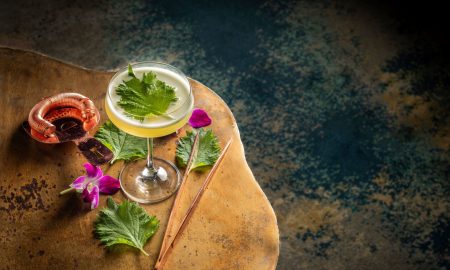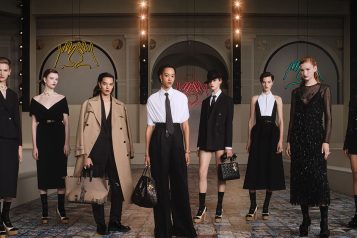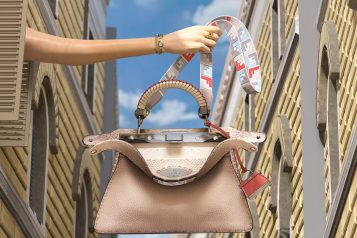
SHOT ON LOCATION AT: TRIBECA JOURNAL STUDIO
When Uzo Aduba looks in the mirror, she is proud of the woman she sees reflected back at her. She is a woman who can whistle through the gap in her front teeth, make dolphin sounds at will and quote Shakespeare on command. She is one of only two people in history to win two Emmys for the same role in both the comedy and drama categories, both for the uber-popular Netflix series, Orange is the New Black. She is award-winning stage actress who has successfully mastered both Broadway and The West End. She is confident and she is strong.
Yet, as accomplished and poised as she is, Aduba has also been made to feel ‘less than.’ Fresh off the heels of booking her first Broadway show, Coram Boy, in New York, she was stopped by two plainclothes policemen—for no reason other than the color of her skin. “I was taken aback,” Aduba, now 35, recalls. “I was backing up slowly because I thought I was about to get raped, mugged, killed. My instinct was to run. I wasn’t really interested in taking that encounter lying down, so to speak.”
Instead, she got away—and called 911, all the while shocked at the ludicrous nature of her alleged indiscretion. “I knew what they were saying I was responsible for couldn’t be more fictitious, [that] someone matching my description had been seen vandalizing. I was like, ‘Someone matching my description who was wearing a bright red T-shirt that says Switzerland on the front and a yellow backpack that says Jamaica on it? Come on.’ If only they had opened my backpack, they would have seen the complete works of Shakespeare in there, which I was reading for [college]. I couldn’t have been more [of a] theater kiddie.”
That said, it is a testament to her resilient spirit that she did not allow the experience to break her, define her or rob her of her self-worth. “I remember thinking I did not want to have my dignity taken from me that day. I walked away from that situation with my life, but I was also keenly aware that this was the first time that this had ever happened to me.”
So, no, Uzo Aduba is not going to sit back and stay silent about America’s current racial crisis. Even if she hadn’t been personally persecuted, it is impossible for her to remain unaffected as a woman of color in this uncertain social climate. “I don’t want to see anyone die so, when I’m watching videos or seeing lives being lost on the news, it’s devastating to me,” she says.
“It makes me ask where we’re going as a culture. I think we, as a country, need to prepare ourselves to address the state of things. We need to acknowledge the very hard truth of where we are, and to really begin to have conversations and do the hard work of progressing ourselves forward into what we aspire to be.”
In her opinion, Jenji Kohan, the creator of Aduba’s award-winning Netflix series, Orange is the New Black, is forcing viewers to have that conversation, using the current season to drive home Black Lives Matter.
Kohan, who wrote the script nearly a year and a half ago, before the country escalated to its present peak of violence and unrest, made Aduba’s close friend and co-star Samira Wiley a posterchild for the movement. In the fourth season’s shocking finale, Wiley’s character, fan favorite Poussey Washington, is killed by a Caucasian guard during a peaceful prison protest, leading to a race-related uprising that is anything but peaceful.
“We’re watching on our show what is happening right now in our world. We didn’t shoot this yesterday; we shot it a year ago. [Kohan] is someone who knows where we are as a society and wants to address it in such a magnificent way. She’s excellent in holding up mirrors to people’s faces.”
Aduba notes that the showrunner has successfully blended fictional elements with reality, borrowing ‘snapshots’ that play out on the show. Viewers might recognize nods in homage to the deaths of 17-year-old Trayvon Martin, who was shot and killed by a neighborhood watch volunteer, and New Yorker Eric Garner, who suffocated to death after telling officers he couldn’t breathe 11 times.
She has nothing but praise for the series’ creator, who manages to humanize not only the prison system, but the inmates themselves. “I think a really brilliant thing she did was admit that it’s really challenging to reject the idea of death when that person who we’ve lost is really personal to each of us.
[Poussey] is someone who had a bright future, a woman who was beloved—not only by the women in prison, but all of us watching—or reading [in the script], in [the cast members of the show’s] case. It’s not something you just turn off or switch the channel on. It stays with you in a very different way and forces a conversation […] about how we treat this subject going forward.”
Aduba is doing her part for the movement by playing Suzanne ‘Crazy Eyes’ Warren, her character on Orange is the New Black, with conviction (and the Television Academy would agree, given that she’s won back-to-back Emmy Awards for the role). “I try to go to a place of expression or giving voice to the people or things that I feel have no voice,” she says. “I try to reach inside the stomach of the people who are lost, the people who feel oppressed, the people who feel misunderstood and just try, to the best of my ability, to let them sing.”
Luckily, she doesn’t internalize her character’s problems; she gives them a voice and puts their pain away at the end of her work day.
“That’s the beauty of art,” she notes. “All I ever want to do with my work is give it out, not take it in. I just want to give it away. That’s the easiest way I can express myself.”
She’s found other ways, too, such as penning a letter to her teenaged self about being ‘worthy’—a sentiment that she believes defines her. Aduba’s mother instilled this value and shaped the actress into the strong, sensational woman she is today; a woman who refuses to run from confrontation and isn’t afraid to stand up for herself.
“When I was really little, people couldn’t pronounce my full name, Uzoamaka Nwanneka Aduba. I grew up in this small New England town [Medfield, Mass.] and people couldn’t say it, so I asked my mom to change my name to Zoë. My mom, who is Nigerian, absolutely refused. She would say, ‘If they can learn to say Michelangelo and Tchaikovsky, then they can learn to say Aduba.’ She embedded in me a really clear point.”
Mrs. Aduba wasn’t having any of it about Uzo’s appearance, either. Growing up, she absolutely hated the gap in her front teeth, and expressed a keen desire for braces many times. “The Western ideal of aesthetic beauty was bone-straight chiclet teeth and I didn’t have them. My mom would always tell me, ‘Don’t you know that a gap is a sign of beauty in Africa?’ and I was like, ‘We live in Massachusetts. Help me out, sister!’”
Her refusal meant that Aduba became tight-lipped in more ways than one. While getting her senior high school photo taken, the photographer noticed that she wasn’t shy about laughing or grinning in between takes, but when the shutter snapped, so did her mouth. “He said, ‘Why aren’t you smiling?’” she remembers. “I said, ‘I don’t like my smile.’ He was like, ‘I think you have a beautiful smile.’”
It took some time for the photographer’s words to sink in, but they stayed with her throughout the years. “I remember I just had this impression placed on my spirit about how you see yourself and how others seeing you is different. You need to get in line with how you want to live, and you have to just believe it or talk yourself into it until you believe it. You are beautiful, you are worthy and never let anyone else determine your value for you.”
Self-worth was the greatest gift her mother could have possibly given her. “My mom was imparting these very strong messages on me that I believe, as I’ve matured, taught me how to value myself. It was my mom’s deep wisdom and commitment to me owning who I am that taught me my worth,” she notes, adding, “When I was little, I wanted to change things about myself, the things about myself I’ve now realized make me special. I discovered that I was valuable around when I was 18. I discovered [that] everything that I came into this world being I should be celebrating.”
‘Worthy’ is putting it lightly now. Aduba is the only actress to win Emmy Award recognition in both the comedy and drama genres for the same role, taking home the Primetime Emmy Award for Outstanding Guest Actress in a Comedy Series in 2014 and the Primetime Emmy Award for Outstanding Supporting Actress in a Drama Series in 2015, as well as two Screen Actors Guild Awards for Outstanding Performance by a Female Actor in a Comedy Series. She is also an accomplished, award-winning theater actress, singing and dancing her way through NBC’s recent live production of The Wiz as Glinda the Good Witch. She continues to push herself by transitioning from stage and the small screen to film, where she’ll appear this year in Ewan McGregor’s American Pastoral, as well as in Sian Heder’s Tallulah, which was bought by Netflix at this year’s Sundance Film Festival.
The sky is the limit for Aduba but, no matter what she does, “I am choosing to define for myself who I am in this world,” she vows. “I will not let any external voice or external opinion determine that for me.”





















